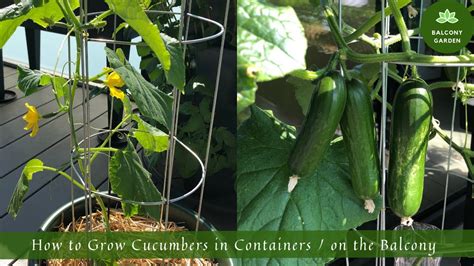Top Fertilizer Options for Growing Healthy Cucumbers on Your Balcony
Growing cucumbers on a balcony is an excellent way to enjoy fresh produce, even in small urban spaces. However, to get the most out of your balcony garden, you need to ensure your cucumbers receive the proper nutrients. Fertilizers play a vital role in supporting the growth of healthy cucumber plants, leading to higher yields and better quality fruits. In this article, we will explore the best fertilizers for balcony-grown cucumbers, how to apply them, and tips for optimizing your harvest.
Key Concepts in Cucumber Fertilization
Before diving into specific fertilizer recommendations, it’s essential to understand a few basic concepts about cucumber nutrition and plant health:
- Nutrient Balance: Cucumbers need a balance of nitrogen (N), phosphorus (P), and potassium (K) to thrive. Nitrogen supports leaf and stem growth, phosphorus is essential for root development and flowering, and potassium strengthens the plant’s overall resistance and fruit development.
- Organic vs. Inorganic Fertilizers: Organic fertilizers, such as compost or manure, slowly release nutrients and improve soil structure, while inorganic fertilizers offer a more immediate nutrient boost but can leach out more quickly.
- pH Levels: Cucumbers prefer slightly acidic to neutral soil with a pH level of 6.0-7.0. Fertilizers can influence soil pH, so monitoring this is important.
Historical Context of Fertilizing Cucumbers
The practice of fertilizing crops dates back to ancient agricultural techniques, where farmers would use composted manure and other organic matter to enrich the soil. In the 20th century, synthetic fertilizers became popular due to their efficiency and quick results. However, recent trends have seen a resurgence of interest in organic methods, particularly among urban gardeners concerned about sustainability and soil health.
Current State Analysis: Best Fertilizers for Balcony Cucumbers
When growing cucumbers in containers on a balcony, the choice of fertilizer becomes even more critical due to the limited space and soil volume. Below are some of the best options:
- Compost: A great organic option, compost enriches the soil with nutrients and improves its water retention properties. You can either make your own compost or purchase it. Regularly adding compost to your balcony garden helps maintain a steady nutrient supply.
- Worm Castings: Known as “black gold,” worm castings are rich in nutrients and beneficial microorganisms. They release nutrients slowly, reducing the risk of over-fertilization. Mix them into your potting soil for sustained benefits.
- Liquid Seaweed Fertilizer: Seaweed is an excellent source of trace minerals and promotes strong root growth. This liquid fertilizer can be diluted with water and applied directly to your cucumber plants every few weeks.
- Fish Emulsion: Fish emulsion is a fast-acting, organic fertilizer rich in nitrogen. It’s perfect for giving your cucumbers a quick boost during their vegetative growth phase. Be mindful of the smell, especially when gardening on a balcony.
- Balanced NPK Fertilizer: For a straightforward solution, a balanced fertilizer with equal parts nitrogen, phosphorus, and potassium (e.g., 10-10-10) works well for cucumbers throughout their growing cycle.
Practical Applications of Fertilizing Cucumbers on Balconies
When applying fertilizer to balcony cucumbers, consider these practical tips:
- Start with Quality Soil: Use a high-quality potting mix designed for vegetables. Mix in compost or organic matter to enhance the soil’s nutrient-holding capacity.
- Follow a Schedule: Fertilize cucumbers regularly, starting two weeks after planting. During the vegetative stage, prioritize nitrogen-rich fertilizers; switch to potassium and phosphorus-heavy options once flowering begins.
- Use Liquid Fertilizers Sparingly: Liquid fertilizers should be applied every two weeks or as per the manufacturer’s instructions. Avoid over-fertilizing, as it can lead to nutrient burn and weak plants.
- Monitor Soil Moisture: Cucumbers need consistent watering. Overwatering can wash away nutrients, so keep the soil evenly moist but not waterlogged.
Case Studies: Success Stories in Balcony Cucumber Gardening
| Case Study | Fertilizer Used | Results |
|---|---|---|
| Urban Gardener in New York | Compost + Liquid Seaweed | High yields, strong vines, and consistent fruit size throughout the season. |
| Apartment Grower in San Francisco | Fish Emulsion + Worm Castings | Fast growth during vegetative stage, larger leaves, and vibrant green cucumbers. |
| Balcony Farmer in Berlin | Balanced NPK Fertilizer | Steady growth, though plants required frequent fertilization due to container limitations. |
Stakeholder Analysis: Who Benefits from Optimal Balcony Fertilization?
Proper fertilization benefits a wide range of stakeholders:
- Home Gardeners: Maximize the space available and enjoy higher yields with healthier plants.
- Urban Communities: Balcony gardens can contribute to food security in densely populated areas.
- Environmental Advocates: Organic fertilizers promote sustainable urban gardening practices, reducing reliance on chemical-based products.
- Local Nurseries: Increased demand for fertilizers and gardening supplies from balcony gardeners helps boost local economies.
Implementation Guidelines for Fertilizing Cucumbers on a Balcony
To successfully implement a fertilization strategy for cucumbers on a balcony, follow these steps:
- Prepare the Soil: Before planting, mix in compost or slow-release organic fertilizer to the potting mix.
- Fertilize According to Growth Stage: Use nitrogen-rich fertilizers during early growth and switch to potassium-rich options when cucumbers start flowering and fruiting.
- Monitor Plant Health: Look for signs of nutrient deficiencies such as yellowing leaves or stunted growth. Adjust your fertilization accordingly.
- Use a Drip Irrigation System: For consistent watering and nutrient delivery, consider a drip system that prevents nutrients from washing out of the soil too quickly.
Ethical Considerations of Fertilizing Balcony Cucumbers
While fertilizers can boost cucumber production, there are ethical considerations, especially concerning environmental impact. Overuse of synthetic fertilizers can lead to nutrient runoff, which may harm nearby water sources. Organic fertilizers, on the other hand, are generally more sustainable but require careful sourcing to ensure they are produced responsibly.
Limitations and Future Research on Balcony Cucumber Fertilization
While much is known about fertilizing cucumbers, future research could explore the following areas:
- Optimizing Fertilization for Small Spaces: Researching specific formulas for container gardening could improve yields without overloading the limited soil volume.
- New Organic Fertilizer Sources: Investigating alternative organic fertilizers, such as algae or insect-derived products, could provide more environmentally friendly options.
- Water Conservation and Fertilization: Studying how drip irrigation systems can reduce fertilizer leaching and optimize nutrient uptake in container gardens.
Expert Commentary on Fertilizing Cucumbers in Urban Spaces
Experts agree that fertilizing cucumbers on a balcony requires a balanced approach, taking into account the limitations of container gardening and the need for sustainability. Organic fertilizers, while slower acting, provide long-term benefits for soil health, which is particularly important in small spaces. However, synthetic options should not be entirely dismissed, especially for beginners who need faster results.
Ultimately, the choice of fertilizer depends on individual circumstances, including the size of your container, the type of potting mix, and how much time you can devote to your plants. By experimenting with different fertilizers and closely monitoring your cucumbers’ growth, you can find the perfect balance that leads to a thriving balcony garden.
Take action today: Try using a mix of organic and inorganic fertilizers to see which works best for your cucumbers. Whether you prefer compost or a balanced NPK formula, start fertilizing regularly and watch your balcony cucumbers flourish!


